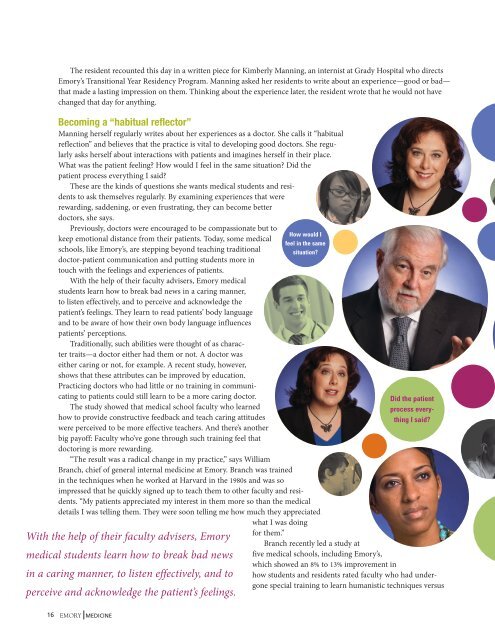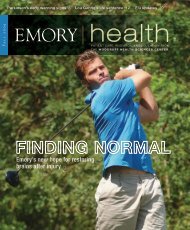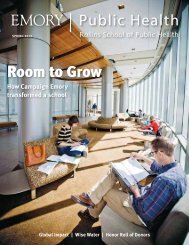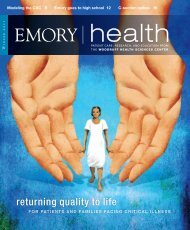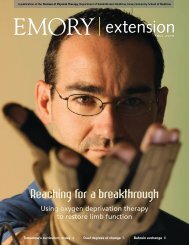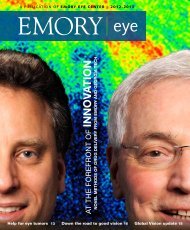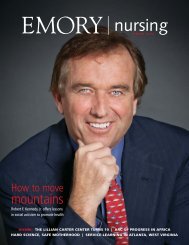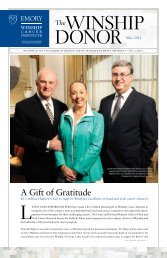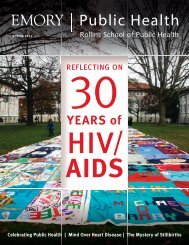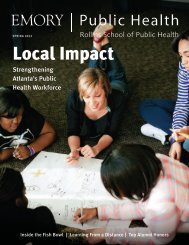medicine - Woodruff Health Sciences Center - Emory University
medicine - Woodruff Health Sciences Center - Emory University
medicine - Woodruff Health Sciences Center - Emory University
Create successful ePaper yourself
Turn your PDF publications into a flip-book with our unique Google optimized e-Paper software.
16<br />
The resident recounted this day in a written piece for Kimberly Manning, an internist at Grady Hospital who directs<br />
<strong>Emory</strong>’s Transitional Year Residency Program. Manning asked her residents to write about an experience—good or bad—<br />
that made a lasting impression on them. Thinking about the experience later, the resident wrote that he would not have<br />
changed that day for anything.<br />
Becoming a “habitual reflector”<br />
Manning herself regularly writes about her experiences as a doctor. She calls it “habitual<br />
reflection” and believes that the practice is vital to developing good doctors. She regularly<br />
asks herself about interactions with patients and imagines herself in their place.<br />
What was the patient feeling? How would I feel in the same situation? Did the<br />
patient process everything I said?<br />
These are the kinds of questions she wants medical students and residents<br />
to ask themselves regularly. By examining experiences that were<br />
rewarding, saddening, or even frustrating, they can become better<br />
doctors, she says.<br />
Previously, doctors were encouraged to be compassionate but to<br />
keep emotional distance from their patients. Today, some medical<br />
schools, like <strong>Emory</strong>’s, are stepping beyond teaching traditional<br />
doctor-patient communication and putting students more in<br />
touch with the feelings and experiences of patients.<br />
With the help of their faculty advisers, <strong>Emory</strong> medical<br />
students learn how to break bad news in a caring manner,<br />
to listen effectively, and to perceive and acknowledge the<br />
patient’s feelings. They learn to read patients’ body language<br />
and to be aware of how their own body language influences<br />
patients’ perceptions.<br />
Traditionally, such abilities were thought of as character<br />
traits—a doctor either had them or not. A doctor was<br />
either caring or not, for example. A recent study, however,<br />
shows that these attributes can be improved by education.<br />
Practicing doctors who had little or no training in communicating<br />
to patients could still learn to be a more caring doctor.<br />
The study showed that medical school faculty who learned<br />
how to provide constructive feedback and teach caring attitudes<br />
were perceived to be more effective teachers. And there’s another<br />
big payoff: faculty who’ve gone through such training feel that<br />
doctoring is more rewarding.<br />
“The result was a radical change in my practice,” says William<br />
Branch, chief of general internal <strong>medicine</strong> at <strong>Emory</strong>. Branch was trained<br />
in the techniques when he worked at Harvard in the 1980s and was so<br />
impressed that he quickly signed up to teach them to other faculty and residents.<br />
“My patients appreciated my interest in them more so than the medical<br />
details I was telling them. They were soon telling me how much they appreciated<br />
what I was doing<br />
for them.”<br />
Branch recently led a study at<br />
five medical schools, including <strong>Emory</strong>’s,<br />
which showed an 8% to 13% improvement in<br />
how students and residents rated faculty who had undergone<br />
special training to learn humanistic techniques versus<br />
With the help of their faculty advisers, <strong>Emory</strong><br />
medical students learn how to break bad news<br />
in a caring manner, to listen effectively, and to<br />
perceive and acknowledge the patient’s feelings.<br />
EMORY MEDICINE<br />
How would I<br />
feel in the same<br />
situation?<br />
Did the patient<br />
process everything<br />
I said?


